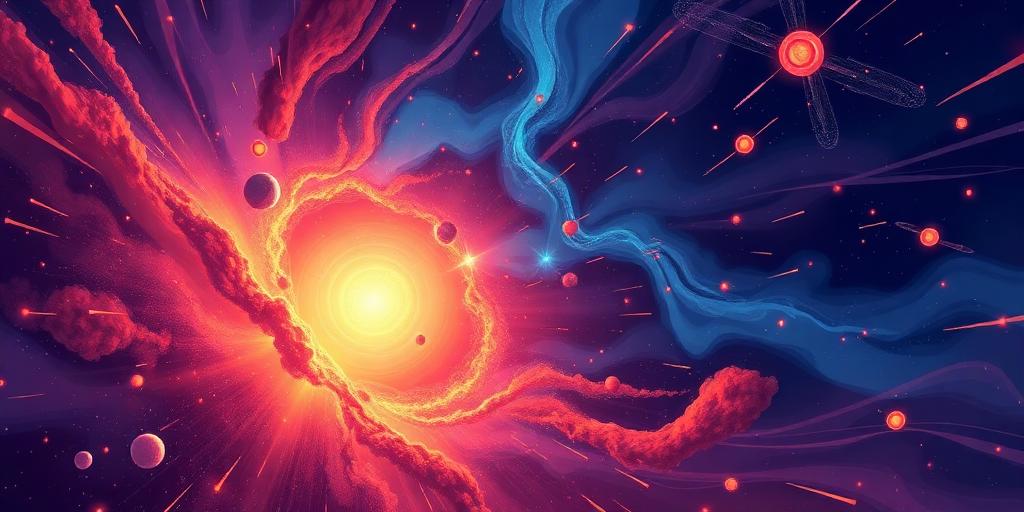Exploring the Origins of the Universe
The universe, a vast and seemingly infinite expanse, has captivated humanity for millennia. From ancient myths to modern science, the quest to understand its origins remains one of our most profound intellectual pursuits. This post delves into the prevailing scientific theories and key discoveries that illuminate the universe's birth and evolution.
The Big Bang Theory: A Primer
The most widely accepted cosmological model for the universe is the Big Bang theory. It posits that the universe originated from an extremely hot, dense state approximately 13.8 billion years ago. This initial state underwent rapid expansion—an event we call the Big Bang—leading to the cooling and expansion of space as we observe it today.
Key Tenets of the Big Bang Theory:
- Expansion of the Universe: Observations by Edwin Hubble in the 1920s revealed that galaxies are moving away from each other, indicating that the universe is expanding. This expansion implies that the universe was once much smaller and denser.
- Cosmic Microwave Background (CMB): The CMB is a faint afterglow of the Big Bang, a uniform radiation that permeates the universe. Its discovery in 1964 provided strong evidence supporting the Big Bang theory.
- Abundance of Light Elements: The Big Bang model accurately predicts the observed abundance of light elements such as hydrogen and helium in the universe. These elements were synthesized in the early universe through a process called Big Bang nucleosynthesis.
Evidence Supporting the Big Bang
Several lines of evidence support the Big Bang theory, solidifying its place as the cornerstone of modern cosmology:
- Redshift: The redshift of distant galaxies provides direct evidence for the expansion of the universe. As galaxies move away from us, their light is stretched, shifting towards the red end of the spectrum.
- Cosmic Microwave Background: The CMB's uniformity and temperature fluctuations provide a snapshot of the universe in its infancy. These fluctuations are the seeds of structure formation, leading to the galaxies and galaxy clusters we observe today.
- Large-Scale Structure: The distribution of galaxies on large scales reveals a cosmic web of filaments and voids, consistent with simulations based on the Big Bang model.
Challenges and Unanswered Questions
Despite its success, the Big Bang theory leaves some questions unanswered:
- What Caused the Big Bang?: The theory describes what happened after the initial expansion but does not explain the cause of the Big Bang itself.
- Dark Matter and Dark Energy: These mysterious components make up the majority of the universe's mass-energy density, yet their nature remains largely unknown.
- The Horizon Problem: The CMB's uniformity across vast distances poses a challenge, as regions of the universe that are now widely separated appear to have been in thermal equilibrium in the early universe.
Alternative Theories
While the Big Bang theory dominates, alternative theories attempt to address its limitations. These include:
- Eternal Inflation: This model suggests that inflation—the rapid expansion of the early universe—is ongoing, with new bubble universes constantly forming.
- Cyclic Models: Cyclic models propose that the universe undergoes cycles of expansion and contraction, avoiding a singular beginning.
- Multiverse Theories: These theories posit the existence of multiple universes, each with its own physical laws and constants.
Future Research
Ongoing and future research efforts aim to refine our understanding of the universe's origins. These include:
- Next-Generation Telescopes: Powerful telescopes like the James Webb Space Telescope will provide unprecedented views of the early universe.
- Cosmological Surveys: Large-scale surveys of galaxies and the CMB will map the universe's structure with increasing precision.
- Particle Physics Experiments: Experiments at the Large Hadron Collider and other facilities seek to probe the fundamental particles and forces that governed the early universe.
Conclusion
The quest to understand the origins of the universe is a continuous journey. While the Big Bang theory provides a robust framework, many mysteries remain. Future research promises to shed light on these questions, deepening our understanding of the cosmos and our place within it.









